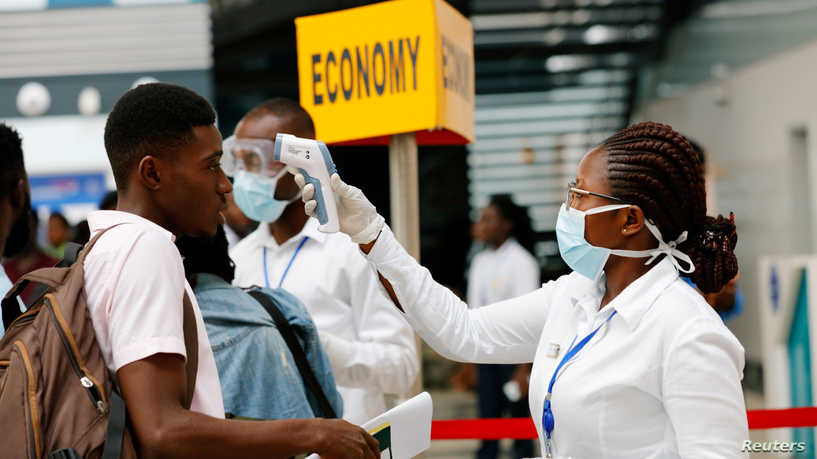
World Health Organisation (WHO) has advised Nigerian government to start screening at domestic airports, railway stations, and long-distance bus stations in the bid to curtail the spread of Coronavirus outbreak among travelers in the country.
The W.H.O advised after Nigeria record its first case of the respiratory virus in sub-Saharan Africa this week, with record number of cases worldwide surpass 83,000.
It also advised Nigerian government to channel efforts on how to reduce the general risk of acute respiratory infections among its citizens, through public health practitioners, travel health clinics, travel agencies, conveyance operators and at Points of Entry.
In a statement title ‘Coronavirus: Travel Advice’ on the W.H.O website, governments across the countries witnessing new cases of the virus were advised to take proactive surveillance more seriously.
It explained that proactive surveillance will immediately detect cases, very rapid diagnosis and immediate case isolation, tracking and quarantine of close contacts should be done. (Read Copy of the W.H.O’s report below)
Recall that Nigerian government on Friday announced the outbreak of the deadly disease (Coronavirus-known as COVID 19) in the country stating that a yet to be named Italian infected with the respiratory virus found his way to the country.
The government said the European got into Nigeria through Turkish Airlines on Monday, February 24, 2020 around 9:40pm and has since made contacts with citizens of the country before screening was conducted to confirm his status.
The latest update from the W.H.O says Coronavirus has killed more than 2,800 people and infected more than 83,000 worldwide just as this as continued to be a call for action for government in countries across the globe.
Window to tackle coronavirus ‘narrowing’: UN chief
UN Secretary-General Antonio Guterres said that containment of the global spread of coronavirus was possible “but the window of opportunity is narrowing”.
“This not a time for panic – it is time to be prepared – fully prepared,” he told reporters in New York.
“Now is the time for all governments to step up and do everything possible to contain the disease. We know containment is possible, but the window of opportunity is narrowing.”
UK’s Johnson says coronavirus is government’s top priority
British Prime Minister Boris Johnson said taking measures to slow the spread of the coronavirus was his government’s top priority and that the public were right to be concerned, in his first television appearance to talk about the issue.
“The issue of coronavirus is something that is now the government’s top priority,” he told broadcasters, adding that he would be chairing a meeting of ministers and officials on the subject on Monday.
Corona virus unlikely to vanish next year: US health official
Anthony Fauci, head of the US National Institute of Allergy and Infectious diseases, said the coronavirus is unlikely to disappear next year and that many more cases should be expected in the US.
Fauci told lawmakers in a closed-door meeting that the US currently does not have enough coronavirus testing resources.
International travellers: practice usual precautions
Coronaviruses are a large family of respiratory viruses that can cause diseases ranging from the common cold to the Middle-East Respiratory Syndrome (MERS) and the Severe Acute Respiratory Syndrome (SARS). In case of symptoms suggestive of acute respiratory illness before, during or after travel, the travellers are encouraged to seek medical attention and share travel history with their health care provider.
Public health authorities should provide to travellers information to reduce the general risk of acute respiratory infections, via health practitioners, travel health clinics, travel agencies, conveyance operators and at Points of Entry. Novel Coronavirus (2019-nCoV) advice for the public published on the WHO website contains WHO standard recommendations for the general public to reduce exposure to and transmission of a range of illnesses, to protect yourself and others from getting sick, to stay healthy while travelling.
WHO technical guidance on surveillance and case definitions, laboratory guidance, clinical management for suspected novel coronavirus, home care for patients with suspected novel coronavirus, infection prevention and control, risk communications, disease commodity package, and reducing transmission from animals to humans is available on the WHO website.
Health measures related to international traffic
The current outbreak originated in Wuhan city, which is a major domestic and international transport hub. Given the large population movements, and the observed human to human transmission, it is not unexpected that new confirmed cases will continue to appear in other areas and countries. With the information currently available for the novel coronavirus, WHO advises that measures to limit the risk of exportation or importation of the disease should be implemented, without unnecessary restrictions of international traffic.
Advice for exit screening in countries or areas with ongoing transmission of the novel coronavirus 2019-nCoV (currently People’s Republic of China)
- Conduct exit screening at international airports and ports in the affected areas, with the aims early detection of symptomatic travellers for further evaluation and treatment, and thus prevent exportation of the disease. while minimizing interference with international traffic;
- Exit screening includes checking for signs and symptoms (fever above 38°, cough), interview of passengers with respiratory infection symptoms leaving the affected areas with regards to potential exposure to high-risk contacts or to the presumed animal source, directing symptomatic travellers to further medical examination, followed by testing for 2019-nCoV, and keeping confirmed cases under isolation and treatment;
- Encourage screening at domestic airports, railway stations, and long-distance bus stations as necessary;
- Travellers who had contact with confirmed cases or direct exposure to potential source of infection should be placed under medical observation. High-risk contacts should avoid travel for the duration of the incubation period (up to 14 days);
- Implement health information campaigns at Points of Entry to raise awareness of reducing the general risk of acute respiratory infections and the measures required, should a traveller develop signs and symptoms suggestive of infection with the 2019-nCoV and how they can obtain assistance.
Advice for entry screening in countries/areas without transmission of the novel coronavirus 2019-nCoV that choose to perform entry screening
- The evidence from the past outbreaks shows that effectiveness of entry screening is uncertain, but it may support risk communication strategy by providing information to travellers from affected countries/areas to reduce the general risk of acute respiratory infections, and to seek medical attention early if they develop symptoms compatible with the infection.
- During the current outbreak with the novel coronavirus 2019-nCoV, a number of exported cases were detected through entry screening implemented by some countries. Symptomatic cases may be detected through temperature screening at Point of Entry, for whom medical examination and laboratory tests will be conducted for confirmation. Temperature screening to detect potential suspect cases at Point of Entry may miss travellers incubating the disease or travellers concealing fever during travel and may require substantial investments. A focused approach targeting direct flights from affected areas could be more effective and less resource demanding.
- Currently the northern hemisphere (and China) is in the midst of the winter season when Influenza and other respiratory infections are prevalent. When deciding implementation of entry screening, countries need to take into consideration that travellers with signs and symptoms suggestive of respiratory infection may result from respiratory diseases other than 2019-nCoV, and that their follow-up may impose an additional burden on the health system. National policy and capacities should be taken into account during the decision-making process.
- If entry screening is implemented, temperature screening should always be accompanied by dissemination of risk communication messages at Points of Entry. This can be done through posters, leaflets, electronic bulletin, etc, aiming at raising awareness among travellers about signs and symptoms of the disease, and encouragement of health care seeking behavior, including when to seek medical care, and report of their travel history.
- Countries implementing temperature screening are encouraged to establish proper mechanism for data collection and analysis, e.g. numbers of travellers screened and confirmed cases out of screened passengers, and method of screening.
- Public health authorities should reinforce collaboration with airline operators for case management on board an aircraft and reporting, should a traveller with respiratory disease symptoms is detected, in accordance with the IATA guidance for cabin crew to manage suspected communicable disease on board an aircraft.








